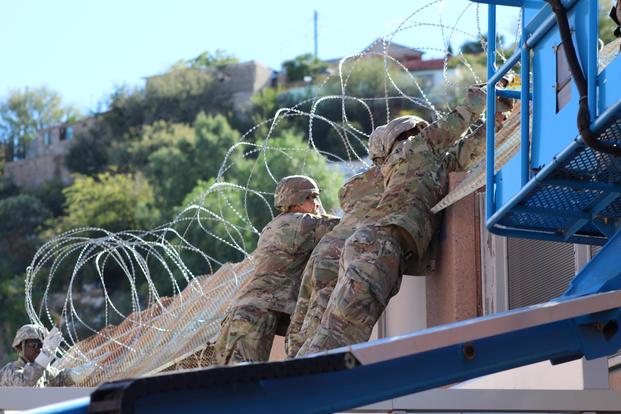Newly confirmed Defense Secretary Lloyd Austin arrived at the Pentagon on Friday to take on a lengthy national security to-do list, including a decision on whether to pull thousands of troops from backup duty at the border wall.
President Joe Biden, shortly after taking the oath of office Wednesday, issued a proclamation to halt funding and construction of the border wall and lifted the national emergency declared by former President Donald Trump that has allowed the deployment of thousands of active-duty and National Guard troops to southwestern states since April 2018.
In ending the national emergency, Biden set the stage for the eventual withdrawal of troops that have been assisting the Department of Homeland Security and Customs and Border Protection, or CBP, said Dr. Robert Sanders, chairman of the National Security Department at the University of New Haven.
Read Next: National Guard Plans to Ask Thousands of Troops to Remain in DC Until Mid-March
"It's not instantaneous," said Sanders, a retired Navy captain and judge advocate general who served in Afghanistan. "[But] they're going to ultimately pull them off."
There are currently about 4,000 National Guard troops from 22 states and Puerto Rico on the border under Title 10 active-duty status, U.S. Northern Command said last week.
Their status going forward will be determined by the requirements of Homeland Security and CBP, a NORTHCOM spokeswoman said.
However, the end of the national emergency will result in the Defense Department "pulling them off Title 10 and redeploying them home," Sanders said.
Since taking office, Biden has issued a series of proclamations and executive orders reversing Trump administration policies on issues from climate change to immigration, including funding for the border wall.
Biden's proclamation on the wall directs the "termination of [the] emergency with respect to the southern border of the United States and redirection of funds diverted to border wall construction."
Border protection is in the national interest, according to the proclamation, "[but] building a massive wall that spans the entire southern border is not a serious policy solution. It is a waste of money that diverts attention from genuine threats to our homeland security."
National Guard troops have been on the border since April 2018. In October of that year, then-Defense Secretary Jim Mattis, at Trump's direction, deployed 5,200 active-duty troops to the border to assist CBP and Homeland in warding off what the president called "caravans" of migrants heading north from Central America.
In February 2019, Trump declared a national emergency when Congress balked at funding the wall. Under the emergency, about $3.6 billion in military construction funding, $2.5 billion for the Defense Department's drug interdiction activities, and $600 million from Treasury's forfeiture fund were diverted to wall construction.
House Speaker Nancy Pelosi and Senate Minority Leader Chuck Schumer called the emergency declaration "a lawless act, a gross abuse of the power of the presidency and a desperate attempt to distract from the fact that President Trump broke his core promise to have Mexico pay for his wall."
In addition to troop withdrawals from the border, Austin also faces an imminent decision on whether to lift the military's effective ban on transgender service.
A Biden executive order issued Wednesday bars workplace discrimination on the basis of sexual orientation or gender identity but did not specifically apply to the military.
Advocacy groups told Military.com's Patricia Kime that they expected the ban on transgender service to be lifted once Austin was installed as SecDef.
Austin, a retired Army general who was awarded a Silver Star for his service in Iraq, is also expected to weigh in on the current plans calling for the withdrawal of about 12,000 of the 36,000 U.S. troops in Germany.
In November, German Defense Minister Annegret Kramp-Karrenbauer said, "During the election campaign, we heard from the Democrats that they aim to look into these plans again very thoroughly," Reuters reported. "At least there is a chance the plans will be changed."
Other German officials have said there has been little, if any, movement thus far in carrying out Trump's surprise announcement last July that troops would be withdrawn from Germany.
"We don't want to be the suckers any more," Trump told reporters at the White House shortly after making the announcement. "We're reducing the force because they're not paying their bills; it's very simple."
Then-Defense Secretary Mark Esper later said that about half of the 12,000 troops would be sent back to the States and the other half would be redeployed in Europe.
Trump's announcement of the withdrawal drew immediate bipartisan opposition in Congress that July. On Jan. 1, Congress overrode Trump's veto of the National Defense Authorization Act, including a provision on the troop withdrawal.
The provision said that troop levels in Germany should remain at 34,500 until 120 days after the defense secretary submitted cost estimates and assessments of the impact of a withdrawal on allies and military families.
On Friday, new National Security Adviser Jake Sullivan made a series of separate calls to German, French and British officials, the White House announced.
The new White House press office did not immediately respond to a query on whether the troop withdrawals from Germany were discussed in the calls to officials of NATO member states.
-- Richard Sisk can be reached at Richard.Sisk@Military.com.
Related: It's Official: Lloyd Austin Is the First Black Defense Secretary














